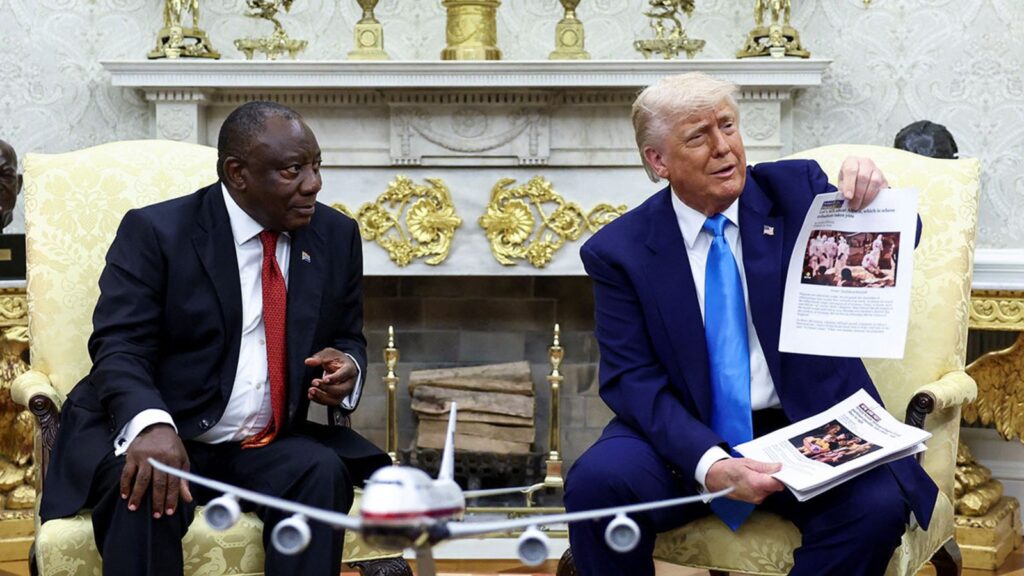Tensions Rise as Donald Trump Confronts Cyril Ramaphosa in South Africa
The recent meeting between former U.S. President Donald Trump and South African President Cyril Ramaphosa ignited significant controversy, reflecting deep divisions within South African society. Trump, known for his polarizing rhetoric, took an unexpected approach during their Oval Office encounter, highlighting issues related to Afrikaner communities and suggesting they face persecution.
Response from Afrikaner Groups
Afrikaner right-wing organizations greeted Trump’s confrontation with enthusiasm. The Solidarity Movement, which had previously lobbied the Trump administration, expressed joy that South Africa’s pressing issues were gaining international attention. Ernst Roets, a prominent figure within these circles, praised Trump on social media, stating, “Donald Trump made history today.” He emphasized the impact of visuals shown by Trump, which included controversial clips of opposition leader Julius Malema.
Jaco Kleynhans, another member of the Solidarity Movement, claimed Trump deserved a Nobel Prize for advocating the plight of white farmers, describing a so-called “farm murder crisis” that has become a focal point for these groups.
| Organizations | Position |
|---|---|
| Solidarity Movement | Advocates for white farmers, claims persecution |
| Economic Freedom Fighters (EFF) | Promotes land nationalization; criticized by right-wing groups |
| Democratic Alliance (DA) | Opposes EFF, aims for national unity |
South Africa’s Political Landscape
In a contrasting response, President Ramaphosa maintained a composed demeanor throughout the confrontation, emphasizing the need for unity in addressing the nation’s challenges. He acknowledged the complexity of crime in South Africa, which affects all demographics rather than being solely a racial issue. Critics of the right-wing lobby groups have stated that their actions have been detrimental to national unity, especially given the country’s history of collaborative governance.
John Steenhuisen, leader of the Democratic Alliance and South Africa’s highest-ranking white politician, reminded the attendees that the government is committed to reducing crime rates, dispelling the narrative that the majority of white farmers are fleeing the country. He highlighted the significance of South Africa’s unity in tackling economic and social issues.
The Broader Context
Trump’s framing of the encounter underscored the role of the EFF and its controversial strategies, including the chanting of ‘Shoot the Boer’, which has sparked significant backlash from Afrikaner quarters. Despite its roots in anti-apartheid protests, the context in which the song is rendered has been a matter of legal and moral debate, with South Africa’s judiciary ruling that it does not incite violence in its current use.
Calls for Action
In a striking conclusion to the meeting, various South African representatives emphasized the need to address crime, not through racial lenses but through cooperative efforts to foster economic growth and safety. Zingiswa Losi, a trade union leader, articulated the urgent need for addressing rural crime that disproportionately impacts the black majority, promoting a narrative that seeks solutions beyond racial divisions.
This encounter serves as a reminder that while political climates shift, the underlying issues facing South Africa demand comprehensive, unified responses rather than divisive tactics. As both leaders continue to navigate these complexities, the hope remains that a path forward can be forged that incorporates the voices of all South Africans.


